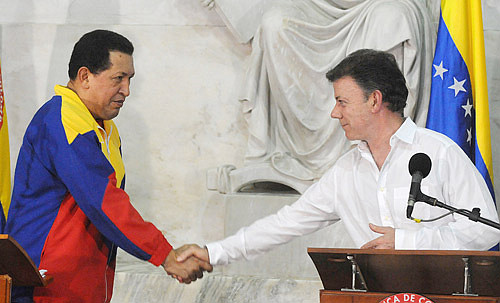|
 |
|
A HANDSHAKE OF RECONCILIATION: Colombian President Juan Manuel Santos shakes hands with visiting Venezuelan President Hugo Chavez at a press conference in Santa Marta on August 10. The two announced a restoration of diplomatic ties (XINHUA/AFP) |
This was one reason why Uribe was able to win a second term, and it was also a decisive factor in Santos' victory in the presidential run-off on June 20. Santos worked as defense minister during Uribe's second term and shared his predecessor's tough stance in dealing with anti-government forces.
The U.S. factor
The United States insisted on classifying the FARC and the ELN as terrorist organizations, but Chavez expressed sympathy for them. He once called on the international community to remove them from the blacklist of terrorist organizations.
In diplomatic disputes between Venezuela and Colombia, the role of the United States cannot be ignored. Most of the drugs that Americans consume come from Colombia and other Andean countries. Therefore, for a long time, the United States has provided strong economic, military and diplomatic support to Colombia's anti-drug efforts. This is why Chavez called Colombia a U.S. puppet in South America.
In August 2009, Colombia concluded negotiations on a bilateral military agreement with the United States, aimed at strengthening security and defense cooperation. This displeased Venezuela, as, according to the agreement, Colombia would allow U.S. troops to use its military bases. Undoubtedly, a U.S. military presence would pose a grave threat to Venezuela's national security.
An overwhelming majority of South American countries were opposed to the agreement. For instance, Uruguay has always been against foreign nations' establishing military bases in South America. In addition, Ecuadorian President Rafael Correa said the United States wanted to turn the military bases in Colombia into a strategic outpost for the U.S. Southern Command in South America, which was unacceptable to South American countries.
After the most recent Venezuela-Colombia diplomatic dispute occurred, Chavez claimed Venezuela would suspend oil deliveries to the United States if there were to be armed aggression against Venezuela from Colombia or any other nation supported by the United States.
Such threats from Chavez were common and international observers felt this threat would not come to fruition. It is important to note that Venezuela mainly produces heavy crude oil, while the United States owns the best refining equipment for such oil.
In addition, Venezuela's oil exports to the United States account for nearly half of its total oil exports. And as the two countries are close geographically, delivery costs are low. If Venezuela stopped exporting oil to the United States, it would be difficult for Venezuela to find a similarly convenient alternative market.
Growing solidarity
Santos, who adopted a hard-line stance in dealing with anti-government armed forces, regarded himself as a hawk even before taking over. But, as the international media pointed out, he is also a pragmatic politician. During his campaign, he repeatedly emphasized that he would continue Uribe's domestic and foreign policies, creating a peaceful and prosperous life for the Colombian people.
Venezuela is Colombia's second biggest export market behind the United States, and the two nations share a border that stretches more than 2,000 km. Every day, tens of thousands of people cross that border for various economic activities.
Santos understands that the stability of the border area is crucial to his work as president. Therefore, after taking office on August 7, he gave top priority to settling the diplomatic dispute between the two countries.
There is a deep-rooted desire for solidarity in South America. Latin American liberation hero Simon Bolivar (1783-1830) once dreamed of uniting the South American countries into one big family.
Despite the disputes between countries in the region in recent years, this aspiration toward solidarity will remain.
On December 8, 2004, 12 South American countries established the South American Community of Nations (CSN). The member countries, combined, cover an area of more than 17.6 million square km. The community has a population of 360 million, a GDP of $970 billion, a forest area of 8 million square km and 27 percent of the world's total fresh water. Its export volume exceeds $180 billion.
Chavez said the establishment of the CSN meant the Latin American people are realizing Bolivar's dream. Argentina's former President Eduardo Duhalde said the CSN would have a common currency and parliament, much like the EU. It may take several decades, but the countries were taking the first steps.
On April 16, 2007, the CSN was renamed the Union of South American Nations.
Three years later, on February 23, 2010, Latin American leaders at the 23rd Rio Group Summit in Playa del Carmen, Mexico, decided to establish a 33-member Community of Latin American and Caribbean States. This community is expected to be officially inaugurated in July 2011.
Mexican President Felipe Calderon, then rotating President of the Rio Group, said at the closing of the summit that the establishment of the community would further increase the international status and influence of the entire region.
After the Venezuela-Colombia diplomatic dispute erupted in July, UN Secretary General Ban Ki-moon, Secretary General of the Organization of American States Jose Miguel Insulza, Secretary General of the Union of South American Nations Nestor Kirchner and Brazilian President Luiz Inacio Lula da Silva all made efforts to help repair relations between the two countries. This is clear evidence that the trend toward enhanced solidarity among Latin American countries will continue.
The author is vice president of the Chinese Association of Latin American Studies and a research fellow with the Chinese Academy of Social Sciences | 